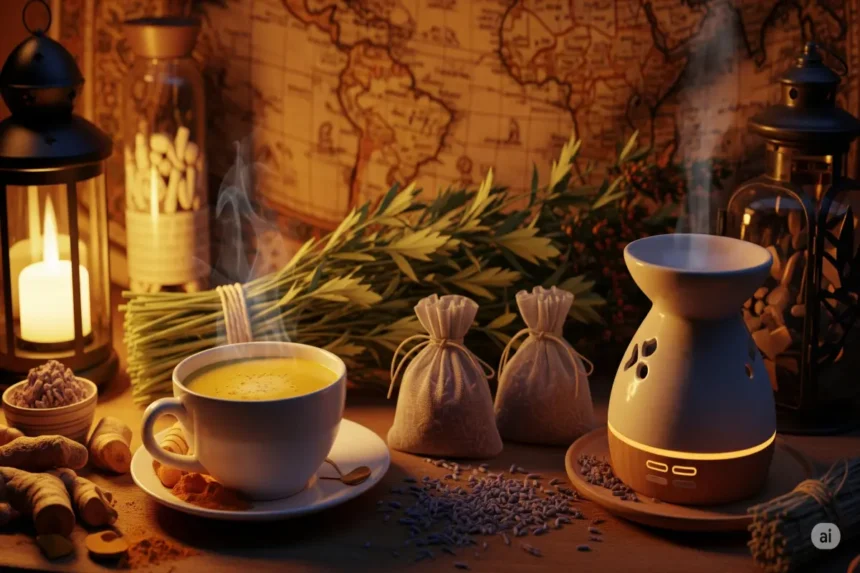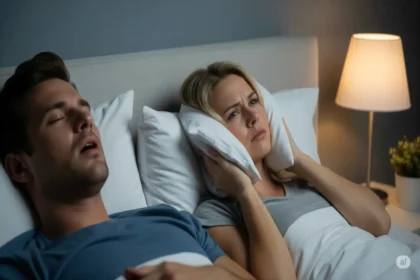In our relentless pursuit of a good night’s sleep, we often turn to the latest gadgets, pharmaceutical innovations, and complex sleep protocols. Yet, perhaps the answers we seek lie not in cutting-edge technology, but in the echoes of the past. The profound insights of Ancient Wisdom for Modern Sleep reveal that cultures across the globe, long before the advent of sleep labs and melatonin supplements, developed sophisticated systems and gentle remedies to coax the body and mind into restorative slumber. These traditional approaches, often rooted in a holistic understanding of health and a deep connection to nature, offer a rich tapestry of practices that continue to hold relevance and scientific merit in our perpetually tired modern world.
Imagine an ancient Roman, troubled by restless nights, seeking solace in a warm bath infused with calming herbs before retiring. Or a weary traveler in India, receiving a gentle oil massage and a soothing herbal concoction to prepare for rest. These aren’t just quaint historical footnotes; they are glimpses into a universal human quest for peaceful sleep, solved through centuries of observation, experimentation, and an intuitive understanding of the body’s rhythms. As we grapple with an unprecedented global sleep crisis, looking back at these time-tested traditions can illuminate new pathways to reclaiming our nights.
The Universal Quest for Rest: A Timeless Challenge
Sleep problems are not a modern invention. Throughout history, humans have faced challenges to their rest – from the anxieties of survival to the demands of agricultural cycles. What sets ancient approaches apart is their often holistic perspective, viewing sleep as an integral part of overall well-being, influenced by diet, daily routines, emotional state, and environmental harmony. They didn’t just treat symptoms; they sought to restore balance.
Ayurveda: The Science of Life and Sleep (India)
Originating in India over 5,000 years ago, Ayurveda is one of the world’s oldest holistic healing systems. It views health as a delicate balance of three fundamental energies or “doshas”: Vata, Pitta, and Kapha. Sleep disturbances, in Ayurveda, are often attributed to an imbalance, particularly an excess of Vata (associated with movement, anxiety, and an overactive mind).
Ayurvedic sleep remedies focus on restoring balance through diet, lifestyle, and herbal medicine:
- Dietary Adjustments: Emphasizing warm, grounding, and easily digestible foods in the evening. Avoiding cold, dry, or stimulating foods. Warm milk with a pinch of nutmeg or cardamom before bed is a classic Ayurvedic remedy, believed to calm Vata.
- Herbal Allies:
- Ashwagandha (Withania somnifera): Known as an adaptogen, it helps the body adapt to stress, reducing anxiety and promoting relaxation. Modern research supports its anxiolytic properties, which can indirectly improve sleep.
- Brahmi (Bacopa monnieri): Traditionally used to calm the nervous system, improve cognitive function, and reduce stress, thereby aiding sleep.
- Jatamansi (Nardostachys jatamansi): Valued for its sedative and tranquilizing properties.
- Rituals and Routines (Dinacharya):
- Abhyanga (Self-Oil Massage): A warm oil massage (often with sesame or almond oil) before bathing, particularly focusing on the head and feet, is believed to calm the nervous system and promote deep sleep. The warmth and tactile stimulation activate the parasympathetic nervous system.
- Warm Baths: Similar to modern recommendations, warm baths are encouraged to relax muscles and lower core body temperature, signaling sleep.
- Pranayama (Breathing Exercises): Gentle breathing techniques, like Nadi Shodhana (alternate nostril breathing), are practiced to balance energy and quiet the mind before bed.
Traditional Chinese Medicine (TCM): Harmonizing Qi for Sleep (China)
Traditional Chinese Medicine, with roots stretching back over 2,000 years, views sleep as a dynamic interplay of Yin and Yang energies and the smooth flow of Qi (life force) through the body’s meridians. Insomnia is often attributed to imbalances such as Liver Qi stagnation, Heart Fire, or Kidney Yin deficiency.
TCM approaches to sleep are highly individualized and include:
- Acupuncture: Specific acupuncture points are targeted to balance Yin and Yang, calm the spirit (Shen), and regulate Qi flow, thereby promoting sleep. Research has shown acupuncture can increase nocturnal melatonin secretion and improve sleep efficiency.
- Herbal Formulas: TCM utilizes complex herbal formulas tailored to the individual’s specific imbalance.
- Suan Zao Ren (Jujube Seed): One of the most common herbs for insomnia, traditionally used to nourish the Heart and calm the spirit.
- Long Yan Rou (Longan Fruit): Used to nourish blood and calm the mind.
- He Huan Pi (Albizia Bark): Known as the “happiness herb,” it’s used to soothe emotions and promote sleep.
- Dietary Therapy: Recommendations often include foods that nourish specific organs or balance energies, such as millet porridge, lotus seeds, or lily bulbs. Avoiding stimulating foods and cold drinks in the evening is common.
- Tai Chi and Qigong: Gentle movement practices that cultivate mindful awareness and regulate Qi flow, promoting relaxation and preparing the body for sleep.
Mediterranean Traditions: Diet and Lifestyle for Serenity (Mediterranean Region)
While not a formal medical system like Ayurveda or TCM, the traditional Mediterranean lifestyle, deeply ingrained in cultures like Greece, Italy, and Spain, inherently promotes sleep through its emphasis on diet, social connection, and a relaxed pace of life.
- The Mediterranean Diet: Rich in fruits, vegetables, whole grains, legumes, nuts, seeds, and olive oil, with moderate consumption of fish and poultry, and limited red meat. This diet is naturally anti-inflammatory and provides key nutrients beneficial for sleep:
- Omega-3 Fatty Acids (from fish): Linked to improved sleep quality and duration.
- Magnesium (from leafy greens, nuts): A natural muscle relaxant and calming mineral.
- Tryptophan (from nuts, seeds, some fish): Precursor to serotonin and melatonin.
- Antioxidants (from fruits, vegetables, olive oil): Reduce oxidative stress, which can disrupt sleep.
- The Siesta: In many Mediterranean cultures, a midday nap (siesta) is a long-standing tradition, allowing for rest and rejuvenation during the hottest part of the day. Modern sleep science supports the benefits of strategic napping for cognitive function and stress reduction.
- Communal Meals and Relaxation: The cultural emphasis on long, leisurely meals shared with family and friends, followed by a period of relaxation, naturally reduces stress and promotes a slower pace of life conducive to sleep.
Native American Practices: Connecting with Nature’s Rhythms (North America)
Across diverse Native American tribes, sleep was often seen as a spiritual journey, a time for connecting with ancestors, receiving guidance from the spirit world, and maintaining harmony with nature. Remedies were deeply tied to the land and traditional healing practices.
- Herbal Wisdom: Various plants were used for their calming and sedative properties:
- Passionflower (Passiflora incarnata): Used by many tribes for its calming effects, to reduce anxiety, and promote sleep. Modern research confirms its anxiolytic and sedative properties.
- Valerian Root (Valeriana officinalis): Used by some tribes as a mild sedative. It’s a well-known traditional sleep aid in Europe as well.
- Chamomile (Matricaria chamomilla): Used for its calming effects.
- Rituals and Storytelling: Bedtime rituals often involved storytelling, drumming, or chanting, which could create a soothing, rhythmic environment conducive to sleep. The content of stories often carried moral lessons or connected individuals to their heritage, providing emotional comfort.
- Dream Interpretation: Dreams were considered sacred messages, offering guidance for hunting, healing, or tribal decisions. The act of interpreting dreams helped individuals process their experiences and find meaning, which could reduce nocturnal anxieties.
- Connection to Nature: Living in tune with natural light-dark cycles, without artificial light disrupting melatonin production, naturally supported healthy sleep patterns.
European Folk Remedies: Herbs and Warm Rituals (Europe)
Across various European cultures, folk remedies for sleep often centered around readily available herbs and comforting rituals.
- Herbal Teas:
- Chamomile: Widely used for its mild sedative and anti-anxiety properties. It contains apigenin, an antioxidant that binds to specific receptors in the brain, promoting sleepiness.
- Lavender: The scent of lavender is renowned for its calming and relaxing effects. Lavender essential oil, used in diffusers or baths, has been shown to improve sleep quality.
- Lemon Balm (Melissa officinalis): Valued for its ability to reduce stress and anxiety, thereby aiding sleep.
- Valerian Root: A more potent sedative, often used for insomnia and anxiety.
- Warm Drinks: Warm milk, often with honey, was a common bedtime drink, providing both comfort and a source of tryptophan.
- Warm Baths: Soaking in a warm bath before bed was a popular ritual, relaxing muscles and preparing the body for sleep by facilitating a drop in core body temperature afterward.
- Bedtime Rituals: Simple, consistent routines, like reading by candlelight or listening to soft music, were intuitively understood to signal the body that it was time to wind down.
Bridging the Gap: Ancient Wisdom Meets Modern Science
What’s truly fascinating is how modern sleep science is increasingly validating many of these ancient practices. The emphasis on:
- Consistent Routines: Aligns with modern understanding of circadian rhythms.
- Dietary Choices: Highlights the role of specific nutrients (magnesium, tryptophan, melatonin, omega-3s) in neurotransmitter and hormone production.
- Herbal Remedies: Many traditional herbs are now being studied for their active compounds and their effects on sleep-related pathways.
- Relaxation Techniques: Practices like massage, warm baths, and breathing exercises are now understood to activate the parasympathetic nervous system, counteracting the “fight or flight” response that hinders sleep.
- Environmental Harmony: The natural light-dark cycles that governed ancient lives are now recognized as crucial for melatonin regulation.
While ancient remedies offer valuable insights, it’s important to approach them with a modern, scientific lens. They are powerful complementary tools, but they are not substitutes for professional medical diagnosis and treatment for severe sleep disorders like sleep apnea or narcolepsy. However, for many struggling with mild to moderate insomnia or general restlessness, these time-tested traditions offer gentle, natural pathways to better rest.
Conclusion: The Timeless Art of Sleep
The search for restful sleep is a journey that spans millennia, connecting us to our ancestors who, like us, yearned for the peace of the night. The Ancient Wisdom for Modern Sleep reminds us that the solution to our sleep woes may not always lie in the newest invention, but in the timeless practices that honor our body’s natural rhythms and its profound connection to nature.
From the Ayurvedic oil massages of India to the herbal teas of Europe, and the mindful practices of indigenous cultures, these traditional remedies offer a powerful testament to humanity’s enduring ingenuity in the face of a universal need. By thoughtfully integrating these age-old insights into our contemporary lives, we can rediscover the gentle art of falling asleep, transforming our bedrooms from battlegrounds into sanctuaries, and reclaiming the deep, restorative slumber that is our birthright. It’s a journey back to basics, a re-synchronization with the wisdom of the past, promising not just better sleep, but a more balanced, harmonious, and vibrant life.
Disclaimer: The information provided in this article is for general informational purposes only and does not constitute medical advice. It is not a substitute for professional medical advice, diagnosis, or treatment. Always seek the advice of your physician or other qualified health provider with any questions you may have regarding a medical condition. Never disregard professional medical advice or delay in seeking it because of something you have read on this website.














